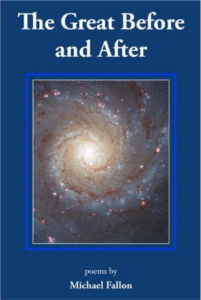Fall 2011
Table of Contents - Vol. VII, No. 3
Poetry Fiction Translations Reviews
Dan Cuddy
Michael Fallon,
Since You Have No Body, Plan B Press. 40 pages. Winner of the 2011 Plan B Press Poetry Chapbook Contest $9.00. Book can be ordered from www.planbpress.com
Michael Fallon,
The Great Before and After, BrickHouse Books, 2011. ISBN: 1-935916-07-9, 41 pages paperback $10.00
The year 2011 saw the publication of two slender volumes of poetry by Baltimore writer Michael Fallon. Since You Have No Body is a book of imagistic lyric poetry whose occasion is a memorializing and a grieving for a number of the poet’s friends who had died in recent years. The other book, The Great Before and After is a book of conceptual lyrics that creates a mythology that is very much in keeping with the scientific discoveries and philosophic musings of the 20th/21st centuries. Each book emphasizes a side of the author’s skill and vision. Both share certain characteristics: clarity of word and image; a building piece by piece of images and/or ideas to achieve a structural whole; a sense of beauty and awe in the poet’s sensibility. Sadly much of contemporary poetry lacks beauty and awe; it is too self-centered with neuroses or grievances. Michael Fallon, though personal at times, never permits himself to get in the way of his vision, which is shared with the reader in recognizable communal language. If there are obscurities and personal references, there are footnotes in the back of Since You Have No Body, the more personal of the books.
The imagery of the physical world carries the poems of Since You Have No Body. Yes, that seems like such a trite thing to say about poetry, but that issue will be addressed shortly. Fallon has a deft touch in picking the right image to further his poems. His imagery works so subtly in the reader’s mind. It is almost pre-conceptual in this book. Though all of his poems are quotable, I will use two to demonstrate his magic.
All afternoon, it snowed furiously,
Blew north, then south, corkscrewed around street lamps,
Decided otherwise, settled on
The hoods of cars, blanked out the lawns and
Sidewalks, where the lot of us, laughing,
Nipped whiskey from a flask. The elaborate toasts
We shouted echoed down the block
Before the storm blew back. How the white wind
Flew then, down unfamiliar streets into
The veiled distances. And when I looked
To say goodbye, you’d all turned off somewhere:
No one here and nothing but the cold.
Soundings is written to and about a friend, almost a recluse, who was obsessed with philosophic thought. The poem below is both a psychological portrait, built through its imagery, and a statement, perhaps a sad one.
With your hash pipe, desk-lamp, console of books
To navigate, you were the single crewman of a submarine,
Slipped beneath the sonar of unanswered doorbells
And phone calls. Weeks into the dive, you calculated
The effects of isolation, inhaled the stale air of visionaries
And suicides. Did any of your philosophers hold
At the crushing depth? Did God break the code of silence?
Like a Cousteau, an Icarus, like a lost star,
You descended into the fathomless dark, alert
To the oracles of loneliness, hallucinations, soundings
Of the real. After your death, the flotsam surfaced
On your blotter: ashes, note cards in script, indecipherable.
The Great Before and After is almost unique for these times. Though there is imagery, the poetry is driven by abstract thought and that abstraction is by the alchemy of the poet changed into gold . How can abstraction be poetry? Isn’t abstraction dogmatic, or vague, or lazy thinking? Not here. In the titled poem we have this:
That had not happened
In the non-happening time before
The beginning and the long
Unhappening
After the end.
Beginning with the great before,
He first imagined
A long twiddling of thumbs,
A succession of black eternities.
He dreamed up all the zeros in existence,
Collected them, lined them up carefully,
Peered down the infinite archway
--at the far enda smudge of dark.
The book is not so dead serious as a physics textbook or many an ecclesiastical sermon. The Adam here has a name: George C Tumulty. His adventures in his thoughts and in the cosmos are not without humor. However, the vision is such, if you enter into it with your own thoughts and realizations, it could create the same effect as listening to a symphony. The concepts which Fallon and his character Tumulty explore have an aura of awe intrinsic in them. The poet is creating a contemporary creation myth. The facts, the doubts, the speculations of time, space, of Being and nothingness are sure to rock your world into an awareness of so much more beyond the petty 9 to 5, the little tribal histories, the mirrors in which we imagine ourselves. This slim book jostles with its poetry of concepts.
© Dan Cuddy

